Accelerate > Publications
Search this online library featuring the latest FAO publications, issue papers and briefs which offer up-to-date knowledge and innovative insights for SDG acceleration.
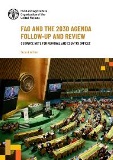
FAO and the 2030 Agenda Follow-up and Review: Guidance Note for Regional and Country Offices
2023
The Guidance Note describes the process of the preparation of the VNRs and what FAO Regional and Country Offices need to be aware and mindful of when providing support to the national partners. It covers information about the importance of the follow-up and review process for the 2030 Agenda and the SDGs, including information about the gaps in the coverage of the Voluntary National Reviews, and recommendations on strengthening VNRs to be meaningful instruments for the acceleration of the SDGs.
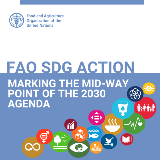
FAO SDG Action: Marking the mid-way point of the 2030 Agenda
2023
As we stand at the midpoint of the 2030 Agenda, it is both a moment of reflection and an opportunity to renew our commitment to achieving the SDGs. In August 2023, the FAO Office of SDGs launched a survey, receiving over 600 responses that shared valuable insights, experiences and actions taken by FAO offices towards the achievement of the SDGs. In addition this survey, FAO project data was leveraged to present this visual representation of FAO’s contribution to the 2030 Agenda implementation.
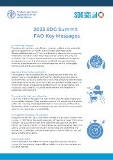
2023 SDG Summit: FAO Key Messages
2023
The 2023 SDG Summit will serve as a pivotal event towards achieving the SDGs, as gathered Heads of State and Government are to carry out a comprehensive review of progress, respond to the impact of multiple crises, and provide high-level political guidance on transformative and accelerated actions for achieving the 2030 Agenda. FAO has developed these key messages to inform the discussions in the lead up to and during this Summit and the Political Declaration which will result from them.
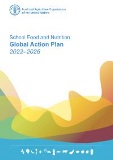
School Food and Nutrition – Global Action Plan 2022–2026
2022
The School food and nutrition - Global action plan seeks to consolidate and guide FAO’s synergistic efforts, setting out priority and concrete outputs to be achieved by 2026.
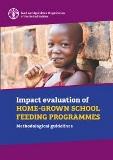
Impact evaluation of home-grown school feeding programmes: Methodological guidelines
2022
This publication seeks to support practitioners by providing methodological guidelines for conducting rigorous impact assessments of Home Grown School Feeding (HGSF) programmes. It presents an overview of the main technical issues to be addressed depending on the characteristics of the context and of the intervention itself.
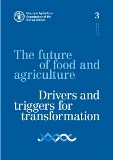
The future of food and agriculture – Drivers and triggers for transformation
2022
This report aims at inspiring strategic thinking and actions to transform agrifood systems towards a sustainable, resilient and inclusive future, by building on both previous reports in the same series as well as on a comprehensive corporate strategic foresight exercise that also nurtured FAO Strategic Framework 2022–31. It analyses major drivers of agrifood systems and explores how their trends could determine alternative futures of agrifood, socioeconomic and environmental systems.
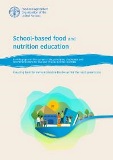
School-based food and nutrition education - A white paper on the current state, principles, challenges and recommendations for low- and middle-income countries
2020
School-based food and nutrition education (SFNE) helps schoolchildren and the school community to achieve lasting improvements in their food practices and outlooks; build the capacity to change and to adapt to external change; and pass on their learning to others. SFNE has also an important role in complementing efforts that are being made globally to improve food environments, and in empowering children and adolescents to become active participants in shaping the food system to be better...
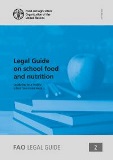
Legal guide on school food and nutrition - Legislating for a healthy school food environment
2020
This Guide promotes a holistic and human rights-based approach to school food and nutrition, in which legislation is an indispensable tool to ensure the sustainability of public policy goals set by a country. In light of international law and standards, it provides practical information and guidance to develop or strengthen national legislation to improve food security and nutrition in schools as well as community development.
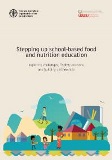
Stepping up school-based food and nutrition education
2019
School-based food and nutrition education (SFNE) represents a crucial opportunity to reach children, families and the broader school community to foster lasting healthy food practices and capacities. The consultation on “Stepping up School-based Food and Nutrition Education: Exploring Challenges, Finding Solutions and Building Partnerships,” was the first of its kind. This report provides a description of the consultation, the results achieved and the recommendations agreed on by the experts.
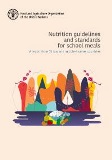
Nutrition guidelines and standards for school meals - A report from 33 low and middle-income countries
2019
Setting nutrition guidelines and standards has been recommended internationally to ensure that school meals are in line with children’s nutrition needs and adequate to their context. This report provides a descriptive overview of the situation of school meal nutrition guidelines and standards in 33 low and middle-income countries as reported through a global survey.
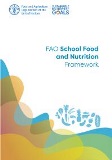
FAO School Food and Nutrition Framework
2019
The FAO School Food and Nutrition Framework aims to support governments and institutions in developing, transforming or strengthening their school policies, programmes and other initiatives for an enhanced and synergistic impact on diets, child and adolescent nutrition, community socioeconomic development and local food systems.
Browse by SDG
- SDG1: No Poverty
- SDG2: Zero Hunger
- SDG3: Good Health & Well-being
- SDG4: Quality Education
- SDG5: Gender Equality
- SDG6: Clean Water & Sanitation
- SDG7: Affordable and Clean Energy
- SDG8: Decent Work and Economic Growth
- SDG9: Industry, Innovation and Infrastructure
- SDG10: Reduced Inequalities
- SDG11: Sustainable Cities and Communities
- SDG12: Responsible Consumption and Production
- SDG13: Climate Action
- SDG14: Life Below Water
- SDG15: Life on Land
- SDG16: Peace, Justice and Strong Institutions
- SDG17: Partnerships for the Goals
Browse by Better
Browse by Priority Area
- Innovation for Sustainable Agriculture Production
- Blue Transformation
- One Health
- Small-Scale Producers' Equitable Access to Resources
- Digital Agriculture
- Healthy Diets for All
- Nutrition for the Most Vulnerable
- Safe Food for Everyone
- Reducing Food Loss and Waste
- Transparent Markets and Trade
- Climate Change Mitigating and Adapted Agrifood Systems
- Bioeconomy for Sustainable Food and Agriculture
- Biodiversity and Ecosystem Services for Food and Agriculture
- Achieving Sustainable Urban Food Systems
- Gender Equality and Rural Women's Empowerment
- Inclusive Rural Transformation
- Agriculture and Food Emergencies
- Resilient Agrifood Systems
- Hand-in-Hand Initiative
- Scaling up Investment
